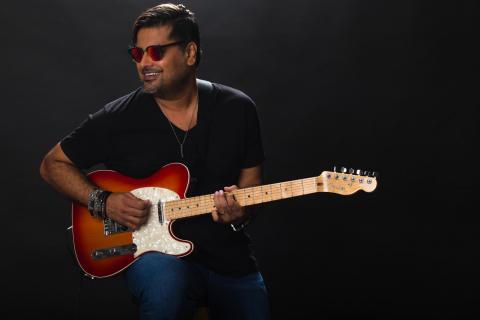Clinton Cerejo: Five Lessons I Learned in the Indian Music Industry

Music producer and singer Clinton Cerejo
Image by René Gaikwad
As part of a weeklong Berklee Indian Exchange (BIX) residency at Berklee's campus in Valencia, Spain, Indian filmmaker and director Rensil D'Silva and acclaimed musician and producer Clinton Cerejo will present clinics from October 17–20 that focus on music for the Indian ad industry and Bollywood through interactive action learning experiences.
The week will culminate with a concert at the Fundación Bancaja on October 20 at 8:00 p.m. that will feature Cerejo along with Annette Philip, artistic director of BIX; Rohith Jayaraman, BIX's assisant manager; and several students.
In advance of the clinics, Cerejo shared with Berklee five lessons he learned in the Indian music industry:
Versatility is the name of the game.
"Over the years, I've worn many hats and learned along the way. Being a singer wasn't enough for me and I found so much satisfaction getting into producing, arranging, and composing. I also got into multiple genres in a big way and that really helped me hone my craft as a producer. Especially working in the jingle industry where every day is a new day that demands something completely unique."
Connect with people so that they can connect with you.
"Over the years I learned that the Indian listener has a very strong tradition and ethos when it comes to music. It's so steeped in their culture and defines who they are that the only way to get them to connect with you as an artist is to talk to them on their level, using musical devices that they can easily understand. If you manage to nail that one device in every song then there's a lot of complexity and interesting ideas that you can put in there and get away with it. I've always loved it when people have connected with my music and musicians have found my songs approachable, yet when they try to play them, there are a few twists and turns that they didn't anticipate."
Never be afraid to break the mold.
"I've been one who's been known to break the rules, and frankly I love to live in that gray area between genres. I've often tried to take a traditional form and turn it on its head, without throwing tradition out the window. That's where work experience comes in and I've been fortunate enough to learn and work with some of the great masters of contemporary Indian composition. I've learned so much about traditional forms along the way. As they say, 'you've got to know the beaten path, not follow it.'"
You can never have too much knowledge.
"I think kids growing up in the age of Google and smartphones are so lucky that way. They've essentially saved themselves years of work figuring out stuff by watching a YouTube tutorial in five minutes. But that's a double-edged sword because when you have something so easily accessible to you, you never really own it. Back in the day, without the internet, becoming a music producer really meant something entirely different. These terms are used rather loosely today."
The most important lesson is to be yourself.
"The most important lesson, and one I try to live by every day, as a musician is a favorite quote from Kurt Cobain: "Wanting to be someone else is a waste of the person you are." If you can communicate 'authenticity' then—more than all the technique and chops you have under your belt—that's the one emotion that will cut through anything and connect straight to your audience. And that's the best validation any musician can have: for your listener to feel you are real."
